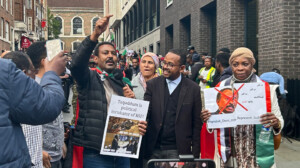Emergency trials against Sudan protesters: punishment or acquittal
Emergency Courts in Sudan have issued a number of verdicts in trials against protesters. Several demonstrators have been convicted to imprisonment, paying fines, or both, while others have been acquitted owing to the absence of complainants
 Demonstration in Sudan (file photo)
Demonstration in Sudan (file photo)
Emergency Courts in Sudan have issued a number of verdicts in trials against protesters. Several demonstrators have been convicted to imprisonment, paying fines, or both, while others have been acquitted owing to the absence of complainants.
A week after the establishment of the Emergency Courts in Sudan, they have issued “various and varied sentences against many of the demonstrators,” defence lawyer for protesters, Muez Hadra, told Radio Dabanga.
“Even though the act for which the sentences are issued is one act of demonstration. Which indicates that these courts do not have a single doctrine, with the knowledge that the demonstration is guaranteed by the Constitution.”
Hadra pointed out that the Emergency Courts have violated the constitutional rights of those who have appeared before them. There has been no integrity of procedures, right of defence, and availability of the intention of justice for these people, the lawyer said.
‘Lawyers challenge the unconstitutionality of declaring the State of Emergency in Sudan.’ – Muez Hadra
“These courts are unconstitutional because the declaration of a State of Emergency, which created these courts, violated the constitution in Articles 210 and 211,” Hadra said. 210 and 211 restrict the country in declaring a State of Emergency, except on the condition the country passes through an exceptional state that leads to instability, war, an invasion into the country, or natural disasters.
“The lawyers are in the process of appealing to these sentences on the one hand, and on the other hand to file a complaint with the Constitutional Court to challenge the unconstitutionality of declaring the State of Emergency in the country.”
Complainants absent
Over the weekend, people in Sudan staged various protests against the State of Emergency which Sudanese president Omar Al Bashir declared last month. A number of people – as many as 870 cases, according to the Democratic Lawyers Alliance – have been tried in the Emergency Courts in Omdurman, Khartoum and Kharotum-North for participating in the demonstrations.
The Democratic Lawyers Alliance announced yesterday that three trials took place against a number of protesters in the Northern Court of Khartoum on Monday. Judge Mohamed Sirelkhatim chaired the trials.
The first case included fifteen accused, however, seven of the accused protesters were released immediately owing to a lack of evidence. The charge against the eight others were dismissed because of the absence of the complainant from the session.
According to the lawyers, the second trial included five accused people. The charge was dismissed against three of them for absence from the session while the remaining two were questioned in the absence of the complainant.
The court finally acquitted them and dismissed the charge.
The complainant was also absent in the third case in the Northern Court. In this case the court ruled to keep it for the absence of the complainant.
The Democratic Lawyers Alliance pointed out that the three cases submitted before Judge Mohamed Sirelkhatim were made under the Criminal Code, and not the Emergency Laws, because they had been filed before the latter were issued on February 25.
Other trials against demonstrators are still ongoing.











 and then
and then